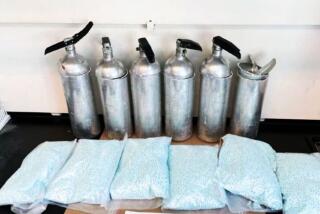Mexican cartels setting up shop across U.S.
The house on Knightner Road is small, blue and white, with a stone front porch and a string of Christmas lights still hanging. Here, crack cocaine was sold to drive-up customers a few miles from the state Capitol in Columbia.
The one on Pound Road in rural Gaston, just south of Columbia, is a brown-and-white trailer, with a gravel driveway and woods out back. Here, federal law enforcement officers surprised Frediberto Pineda, who had 10 kilos of cocaine worth $350,000 in his possession.
Six months went by between the first FBI inquiries into cocaine trafficking at the house on Knightner Road and Pineda’s arrest. But for the bureau, he was a prize worth waiting for. A member of Mexico’s Sinaloa cartel, he had quietly settled in central South Carolina, put down roots and began managing one of the gang’s new outposts in the United States.
As the cartels expand up and out from the Southwest border, they are sending waves of men like Pineda, many of them trained in Mexico, to run their U.S. operations. In the last few years, they have established a prosperous retail industry, with cartels staking out “market territories,” lining up smuggling routes, and renting storage bins and drug houses.
Twice deported after less serious convictions, Pineda looked more like a successful businessman than a drug dealer. He drove a Ford Explorer and wore a shiny watch with red and white jewels.
“He didn’t dress like a construction worker,” lead FBI Agent Michael E. Stansbury said. “He was clean and well-groomed. No dirt under his fingernails.”
The look of prosperity corresponded with a booming business. Earlier this month, FBI Director Robert S. Mueller told Congress that upwards of $39 billion a year in drug profits from north of the border is making it back to Mexico and the cartels.
Atlanta has become a major cartel hub, where cocaine is stored in lockers, storefronts and homes, then trucked to cities such as Columbia, according to federal officials. The Tijuana cartel has set up shop in Seattle and Anchorage, they added. Elements of the Juarez cartel have been busy in four dozen cities, including Minneapolis. The Gulf cartel has reached into Buffalo, N.Y.
When the FBI started looking into the South Carolina drug trade, agents never imagined the investigation would lead them to a Mexican cartel. In all, the effort here has led to charges against 116 people in eight separate indictments, 33 firearms seized, four vehicles impounded, 27 wiretaps approved, and $600,000 in cash and well over $1 million in drugs confiscated. So far, 111 of the defendants have been convicted, while one suspect awaits trail and four fugitives are on the loose.
No one believes Columbia has become drug free, but the city is the first in the nation to have successfully disrupted a cartel that was so deeply ingrained in a U.S. community. The success is being hailed by law enforcement officials as a major victory. “We’ve been standing at a dam and putting our fingers in the holes,” said lead prosecutor Asst. U.S. Atty. Stacey D. Haynes.
In September 2008, the FBI decided to find a way inside the crack house on Knightner Road, after they had heard complaints of drug dealing. So they provided an informant with $100 to pay off a debt to a dealer, and that got the FBI onto the front porch.
Agents soon learned that the main dealer was a character named “G-Money,” and that he sold $100 crack “cookies” off the porch. In fact, business was brisk. “They were selling crack all day, every day,” Agent Stansbury said.
Agents went to court and obtained permission to start wiretapping cellphones and a land-line inside the house. They monitored calls from “Little Wheel” and “Big Wheel,” and eventually expanded the wiretap and picked up on calls from suppliers. One turned out to be “Calero,” one of many nicknames for Pineda.
The conversations were largely in Spanish, in a crude street code. Many of the calls were directly to and from Mexico, many by Pineda and a score of fellow Mexicans working with him. Often the calls were to air complaints about shipments, or to make sure the money was making it home to Mexico. Pineda emerged as the main target.
“We suddenly had a new case with good cartel connections,” said FBI Agent Robert Waizenhofer.
To learn more about him, agents asked state troopers to stop Pineda in his truck. They found $150,000 hidden in a microwave still in the box from Wal-Mart.
But they did not start the arrests until March 2009, and Pineda and his crew were the first to be rounded up — a departure from the FBI’s tactic of normally working a case up the chain. “This time,” said Stansbury, “we took the head off the snake first.”
When they burst inside the Pound Road trailer, they found Pineda hunched over a large Rubbermaid tub, counting packets that added up to 10 kilos of cocaine.
He pleaded guilty to drug conspiracy, but refused to cooperate with authorities for fear the cartel would harm his children in Mexico. He was sentenced to 20 years.
Stansbury said the FBI tried to draw Pineda out in an interview to learn more about the cartel, but the discussion went nowhere. In the back of a car heading from the FBI office to jail, Pineda resisted. “You know what happens in Mexico if I start talking,” he said. “You know what they will do.”
More to Read
Start your day right
Sign up for Essential California for news, features and recommendations from the L.A. Times and beyond in your inbox six days a week.
You may occasionally receive promotional content from the Los Angeles Times.







